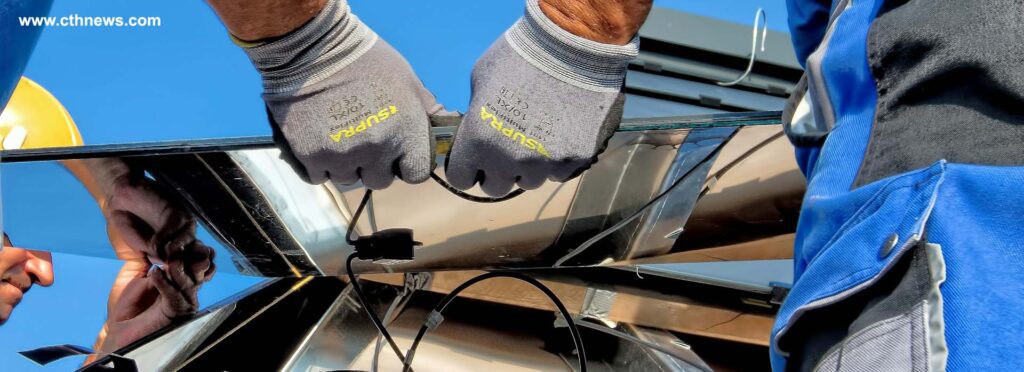Brief Overview of the Increasing Popularity of Solar Energy Worldwide
In recent years, there has been a remarkable surge in the global adoption of solar energy as a sustainable and clean power source. As concerns about climate change and environmental sustainability continue to grow, individuals and businesses are turning to solar solutions to reduce their carbon footprint and embrace renewable energy alternatives. The increasing
popularity of solar energy is driven by its numerous environmental and economic benefits. Solar power systems harness energy from the sun, converting it into electricity, and contribute significantly to reducing greenhouse gas emissions. Governments worldwide are incentivizing the adoption of solar technologies through various initiatives, including tax credits and rebates. As a result, an escalating number of consumers are considering solar installations for residential and commercial purposes, making it a pivotal moment to explore how to choose a solar installer to finance these eco-friendly endeavors.
Importance of Choosing the Right Solar Installer and Financing Option
Selecting the right solar installer and financing option is paramount in ensuring the success and longevity of a solar energy project. The intricacies involved in solar installations demand a careful evaluation of potential installers to guarantee the system’s reliability, safety, and performance. An experienced and certified solar installer possesses the expertise to navigate the complexities of the installation process, ensuring that the solar panels are set up efficiently and securely.
Furthermore, the choice of financing option significantly impacts the project’s financial feasibility. Opting for the most suitable financing option, whether through solar loans, leases, or power purchase agreements, can dramatically influence the upfront costs and long-term savings. Therefore, understanding how to choose a solar installer to finance is crucial for individuals and businesses aiming to embark on a solar journey, ensuring a seamless transition to sustainable and cost-effective energy solutions.
Choosing the Right Solar Installer

Verify licenses, insurance, and certifications of solar installers
When embarking on the journey to harness solar energy, it is paramount to ensure the credibility and expertise of the chosen solar installer. Begin by thoroughly verifying prospective solar installers’ licenses, insurance, and certifications. A trustworthy solar installer should possess the necessary permits, demonstrating compliance with industry regulations and standards.
Insurance coverage is equally crucial, protecting against potential mishaps during installation. Additionally, certifications reflect the installer’s commitment to ongoing professional development. Choosing an installer with these qualifications ensures a reliable and competent partner for your solar project. In pursuing a solar energy solution, the keyword “how to choose a solar installer to finance” emphasizes the importance of a diligent background check to safeguard your investment and ensure a seamless transition to sustainable energy.
Prefer self-performing installers with in-house advanced solar training
Opting for a solar installer with in-house advanced solar training is a strategic move in securing a successful and efficient solar installation. Self-performing installers, possessing comprehensive knowledge of solar technology, are better positioned to handle the intricacies of the installation process. Their advanced training ensures a higher level of expertise and a commitment to safety and quality artistry.
By choosing an installer with in-house training capabilities, you gain the advantage of a team intimately familiar with the equipment and protocols, minimizing the risk of errors during installation. In the context of “how to choose a solar installer to finance,” prioritizing self-performing installers with advanced solar training aligns with making a well-informed decision that guarantees the longevity and efficiency of your solar energy investment.
Obtain multiple quotes from different solar energy contractors
A crucial step in transitioning to solar energy is to gather multiple quotes from various solar energy contractors. This approach aligns with “How to Choose a Solar Installer to Finance,” emphasizing the importance of exploring options. Requesting quotes from different contractors enables you to make an informed decision based on pricing, services offered, and equipment quality. By comparing multiple quotes, you gain insights into the prevailing market rates, allowing you to discern fair pricing for your solar installation. This comprehensive approach ensures that you not only select an installer that meets your financial requirements but also offers optimal value for your investment.
Consider installer reviews and testimonials for reliability
To finance your solar installation, it’s imperative to consider installer reviews and testimonials as valuable resources in gauging reliability. The keyword “how to choose a solar installer to finance” underscores the importance of trustworthiness, making customer feedback a pivotal aspect of decision-making. Evaluate reviews and testimonials to gain insights into the experiences of past clients. Positive reviews highlight an installer’s reliability, efficiency, and commitment to customer satisfaction. Conversely, negative reviews can serve as cautionary indicators. Consider the overall sentiment and specific details shared by clients, providing a well-rounded perspective on the installer’s performance. By prioritizing reliability through the examination of reviews, you ensure that your solar investment is entrusted to a reputable and dependable installer.
Financing Options for Solar Installation

Cash Payment as an Option for Those with Available Funds
In navigating the decision on how to choose a solar installer to finance, one direct approach is through cash payment for those with available funds. This method allows individuals or businesses to invest upfront in solar panels, providing ownership of the system outright. Opting for a cash payment strategy can lead to immediate savings on energy costs without the need for ongoing monthly payments. While it necessitates a substantial initial investment, this approach eliminates long-term financing costs and positions the owner to fully capitalize on available tax credits and incentives for residential solar PV. Ultimately, choosing to pay in cash ensures financial independence and signifies a commitment to a sustainable and eco-friendly energy solution.
Solar Loans for Little to No Money Down and Immediate Usage
When exploring the landscape of how to choose a solar installer to finance, solar loans emerge as a practical choice for those seeking immediate usage of solar energy with minimal upfront costs. This financing option allows individuals or businesses to install solar panels with little to no money, making solar energy accessible to a broader audience. Solar loans distribute the upfront cost across manageable monthly payments, enhancing financial flexibility. This approach facilitates the swift adoption of solar power and aligns with the federal tax credit for residential solar PV, contributing to overall affordability. Choosing a solar installer that offers financing options is a strategic move towards broadening the accessibility of solar energy and encouraging a more sustainable future.
Solar Leases or Power Purchase Agreements (PPA) for Flexibility
Exploring the flexibility offered by solar leases or Power Purchase Agreements (PPA) becomes imperative in discerning how to choose a solar installer to finance. These financing options provide an alternative to ownership, allowing individuals or businesses to benefit from solar energy without the initial capital outlay. Under a solar lease, the installer retains ownership of the solar panels, and users pay a fixed monthly lease amount.
On the other hand, a PPA involves purchasing the electricity generated by the solar panels at a predetermined rate. Both options offer flexibility and can be particularly appealing for those who may need more financial means for a significant upfront investment. Embracing solar leases or PPAs opens the door to immediate clean energy use and supports the broader sustainability goal by encouraging more widespread adoption of solar power.
Overview of the Federal Tax Credit for Residential Solar PV
Understanding the federal tax credit for residential solar PV is pivotal in deciding how to choose a solar installer to finance. This tax credit presents a dollar-for-dollar reduction in income tax, directly impacting the overall cost of a solar PV system. The federal residential solar energy credit applies to a percentage of the system cost.
It can be claimed on federal income taxes for the tax year in which the installation is completed. As of the latest extension, solar PV systems installed between 2022 and 2032 are eligible for a 30% tax credit. This percentage gradually decreases for installations beyond 2032. Being well-informed about these tax incentives is crucial in making financially savvy decisions when financing a solar installation, making the transition to renewable energy more economical and appealing.
Solar Installer Financing Options

Introduction to the various financing options provided by solar installers
In the realm of solar energy, understanding the diverse financing options offered by solar installers is crucial for making an informed decision on how to power your home or business sustainably. How to choose a solar installer to finance involves navigating through several financial models that cater to different needs and preferences.
Solar installers typically present a range of choices, including cash payments, solar loans, solar leases, Power Purchase Agreements (PPAs), Home Equity Line of Credit (HELOC), and Property Assessed Clean Energy (PACE) Financing. Each option carries distinct advantages and considerations, shaping the overall investment in solar power. Individuals and businesses can align their budgetary constraints with their long-term sustainability goals by delving into the nuances of these financing avenues.
Detailed explanations and pros/cons of each option: Solar Loans
Among the plethora of financing options available, how to choose a solar installer to finance begins with a closer look at solar loans. Solar loans allow individuals to acquire a specific loan dedicated to their solar installation project. This option allows ownership of the solar panels, enabling the borrower to benefit from tax credits and other incentives.
The pros of solar loans lie in the immediate accessibility to solar power with minimal upfront costs, fostering a quicker transition to renewable energy. However, it’s essential to consider the cons, such as the loan repayment responsibility and potential interest rates. Potential solar adopters must carefully weigh these factors in alignment with their financial capabilities and long-term sustainability objectives before opting for solar loans.
Solar Leases
When exploring the financing landscape for solar installations, solar leases emerge as an attractive option for those seeking a hassle-free approach to adopting solar energy. In a solar lease, the solar installer retains ownership and maintenance responsibility for the solar panels. At the same time, the customer pays a fixed monthly lease payment for using the solar system. This approach eliminates the need for a substantial upfront investment, making solar energy more accessible to a broader audience.
The primary advantage of solar leases is the immediate cost savings, allowing users to enjoy solar benefits without a significant initial outlay. However, the drawback lies in that lessees may only partially capitalize on long-term savings compared to owning the system outright. Weighing the pros and cons is essential to determine if a solar lease aligns with short-term financial considerations and long-term sustainability goals.
Power Purchase Agreements (PPAs)
Power Purchase Agreements (PPAs) represent another avenue in the diverse solar financing landscape. How to choose a solar installer to finance through a PPA involves entering into a contractual agreement with the solar installer. In this arrangement, the solar company installs and maintains the solar panels on the customer’s property, and the customer purchases the electricity generated by the panels at a predetermined rate.
PPAs often provide immediate savings on electricity bills without the burden of upfront costs. While the financial burden is shifted from installation costs to ongoing monthly payments, the fixed rate ensures stability in energy expenses. However, users must carefully evaluate the contract terms and potential rate escalations to ensure the PPA aligns with their budget and long-term financial goals.
Home Equity Line of Credit (HELOC)
For those with home equity, utilizing a Home Equity Line of Credit (HELOC) presents an appealing option for financing solar installations. How to choose a solar installer to invest via HELOC involves borrowing against the equity in one’s home to fund the solar project. HELOCs typically offer lower interest rates and favorable terms, making it a cost-effective financing solution. The primary advantage lies in leveraging home equity for a sustainable energy investment. However, potential drawbacks include the risk of using home equity and the need for careful financial planning to ensure repayment. Individuals considering this option must assess their home equity, financial stability, and commitment to solar energy before opting for a HELOC.
Property Assessed Clean Energy (PACE) Financing
Property Assessed Clean Energy (PACE) Financing is a unique approach to funding solar installations. This option allows homeowners to finance solar projects through a local tax assessment. How choose a solar installer to finance with PACE involves repaying the financing through additional property tax assessments over an extended period. PACE financing often offers attractive terms, such as fixed interest rates and long repayment periods, making it an appealing choice for those seeking low-risk financing. However, potential drawbacks include the tie to property taxes and the requirement for property eligibility. Prospective users must carefully evaluate their property and tax considerations to determine if PACE financing aligns with their financial strategy and commitment to solar energy.
Choosing the Right Solar Installer: A Step-by-Step Guide

Evaluate Installer Qualifications, Certifications, and Experience
When embarking on the journey of how to choose a solar installer to finance, one of the first steps is to thoroughly evaluate the qualifications, certifications, and experience of potential installers. Opt for installers who possess relevant certifications and have undergone advanced solar training. A self-performing installer with direct, in-house expertise in solar installation ensures a higher level of competence and safety. Consider the number of years an installer has been in the solar industry, as experience often correlates with the ability to handle diverse installation challenges.
Consider Warranties Offered by Solar Installers
When considering how to choose a solar installer to finance, it is crucial to pay close attention to the warranties offered by different installers. A strong warranty not only protects your investment but also reflects the confidence of the installer in the quality of their work. Assess the warranties covering both the equipment and the installation itself. A comprehensive warranty assures that any issues arising post-installation will be promptly addressed, contributing to the longevity and reliability of your solar energy system.
Research Customer Reviews and References for Reliability
As part of the process of understanding how to choose a solar installer to finance, delve into customer reviews and references to gauge the reliability of potential installers. Real-world experiences shared by previous clients offer valuable insights into the installer’s professionalism and the quality of their work. Look for consistency in positive reviews, paying attention to factors such as punctuality, communication, and overall satisfaction. Directly contacting references provided by the installer can provide additional assurance and a more personalized understanding of their service quality.
Assess Supporting Options Tailored to Individual Needs
In the context of contemplating how to choose a solar installer to finance, it’s essential to assess the supporting options offered by each installer and tailor them to your individual needs. Different financing options, such as solar loans, leases, or Power Purchase Agreements (PPAs), cater to varied financial situations. Consider your budget, preferences, and long-term energy goals when evaluating these options. A reputable solar installer will work with you to find a financing solution that aligns with your specific requirements, making the transition to solar energy financially accessible and sustainable.
Emphasize Transparency and Communication in the Selection Process
Transparency and effective communication play a pivotal role in the selection process when deciding how to choose a solar installer to finance. Opt for an installer who is transparent about their methods, costs, and timelines. Clear communication fosters trust and ensures that you are well-informed throughout the entire solar installation journey. Choose an installer who addresses any queries or concerns promptly, providing a smooth and reliable experience. This emphasis on transparency and communication contributes to a positive partnership with the installer, enhancing the overall success of your solar energy project.
Evaluating Solar Installer Reviews

Importance of Gathering Information for an Informed Decision
When considering how to choose a solar installer to finance, the importance of gathering information must be considered. A well-informed decision is crucial in ensuring the reliability, safety, and performance of your solar installation. Gathering information involves verifying licenses and certifications and assessing the experience of solar installers. It also includes obtaining multiple quotes and thoroughly researching the available financing options. By arming yourself with comprehensive information, you empower yourself to make a decision that aligns with your budget, energy goals, and long-term sustainability objectives.
Criteria for Evaluating the Legitimacy and Relevance of Reviews
In the process of choosing a solar installer to finance, evaluating reviews becomes a crucial step. The keyword “how to choose a solar installer to finance” implies a dual focus on the installer’s competence and the financing aspect. When assessing reviews, consider the legitimacy and relevance of the feedback. Look for reviews on credible platforms known for their reliability. Additionally, weigh a variety of opinions to gain a balanced perspective, considering both positive and negative feedback. Validating the authenticity of reviews ensures that the information you gather is trustworthy and contributes to your decision-making process.
Going Beyond Star Ratings: Examining Detailed Reviews for Insights
To truly understand how to choose a solar installer to finance, it’s essential to go beyond simplistic star ratings. Delve into detailed reviews for valuable insights. Star ratings offer a general overview, but the specifics in reviews can provide nuanced information. Look for detailed accounts of customers’ experiences, paying attention to aspects like punctuality, communication, and the installer’s adherence to agreements. Examining the finer details in reviews allows you to gain a deeper understanding of the installer’s strengths and potential shortcomings, aiding you in making a well-rounded decision tailored to your specific needs.
Seeking Additional Confirmations Through Consistency and References
As you navigate the process of how to choose a solar installer to finance, seeking additional confirmations is a prudent step. Consistency in reviews across various platforms and from different customers can reinforce the credibility of an installer. Furthermore, request references directly from the solar installer. Speaking with past clients who have had similar installation sizes or financing arrangements provides firsthand insights into the installer’s performance and customer satisfaction. By seeking additional confirmations, you add layers of assurance to your decision-making process, ensuring that the chosen solar installer aligns seamlessly with your goals and expectations.
Conclusion How to Choose a Solar Installer to Finance
In conclusion, the process of transitioning to solar energy involves a meticulous selection of both a reliable solar installer and a suitable financing option. The keyword “how to choose a solar installer to finance” encapsulates the dual focus on installer competence and financial considerations. Thorough research, verification of licenses, and consideration of customer reviews are essential steps to ensure a successful and sustainable solar installation. Exploring financing choices, such as solar loans or leases, aligns the decision with budgetary constraints. The federal tax credit for residential solar PV further emphasizes the economic advantages of this eco-friendly investment.
In navigating the solar installer selection process, the importance of evaluating reviews becomes apparent. Going beyond star ratings, assessing legitimacy, and seeking additional confirmations through consistency and direct references enhances the decision-making process. This holistic approach empowers individuals to confidently embrace solar energy, making a well-informed decision that not only benefits the environment but also aligns with their financial goals and energy aspirations.
ALSO READ How Much Does It Cost to Start a Group Home? The 9 Steps
Connect with us on INSTAGRAM You can contact us by clicking HERE
How do I choose a solar panel installer?
Seek out an installer accredited by reputable bodies such as the Microgeneration Certification Scheme (MCS) and affiliated with the Renewable Energy Consumer Code (RECC). Membership in Solar Energy UK also indicates reliability.
What should I look for in a solar contract?
A solar agreement should encompass essential components: Pricing, billing, and payment conditions. Specifications and services, covering panel and inverter varieties. Design, licensing, and installation procedures, alongside provisions for alterations if design adjustments are necessary during installation.
How do I find a local solar installer?
Utilize online review platforms such as Yelp! and Solar Reviews to locate providers in your area. After narrowing down your options, explore customer feedback on these platforms to assess each company’s customer service standards and reliability.
